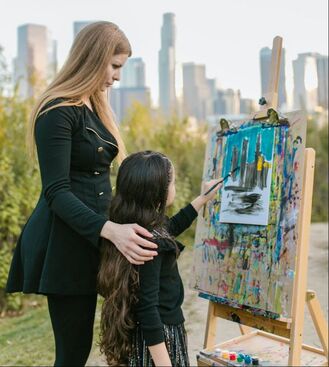|
One of my favorite quotes is from Maya Angelou: “I’ve learned that people will forget what you said, people will forget what you did, but people will never forget how you made them feel.”
As we head into the holiday season, many of us will be spending quality time with family and friends. This is a chance to give the unforgettable gift of making those around us feel seen, heard, valued, and appreciated. Especially as we engage the young people in our lives, there is an opportunity to connect in ways that encourage them to persevere through struggles, anxieties, or disappointments. Many of them may just need to know that our family, our friendship, or our community is a place where they belong. Some may be feeling uncertain or scared and need encouragement to pursue a new opportunity or try something that feels daunting. I have found that sometimes even a short 10–15-minute conversation where someone feels heard and has a chance to process what they are thinking, can result in the encouragement and insight they need to take an important step. The good news is that to have this type of impact, we do not need to possess extraordinary knowledge, experience, or expertise. We simply need to engage those around us with empathy, taking time to ask good questions, listen, and provide specific encouragement. However, this can be difficult because it can require intentionality and sacrifice. Today, with the constant noise and distractions of social media, news feeds, podcasts, music and notifications, we often give things our partial attention. This can become a habit that inhibits our ability to listen fully to those with whom we are interacting. Active listening requires sacrificing our desire to share our own thoughts and experiences, and discipline to ignore distractions and fully focus on the person in front of us. Here are a few other elements of active listening: • Ask good, open-ended questions. • Focus your attention on the speaker. Make eye contact. • Consider body language, facial expressions, tone, and emotions. • Do not interrupt or assume a conclusion before the speaker has finished. • Do not think about what you are going to say next. • Listen to what they are saying and react without judgment. • Reflect what you are hearing and ask clarifying questions. • Provide specific encouragement and affirmation. Listening requires a lot of self-control as we prioritize the other person, their experience and feelings, and manage our own responses and reactions. However, the value of listening is significant. Businessman Nido Qubein offers a good reminder as we engage others this holiday season: “Listen twice as much as you talk, and others will hear twice as much of what you say.”
0 Comments
 I was recently presenting to a group of Gen Z college students. In discussing challenges and barriers they face, one of them commented, “the older generation frowns on us.” While I have heard similar comments in the past, there was a deep sadness that struck me in this statement. Generational misunderstandings are not new, but today young people desperately need hope and encouragement. They need trusted leaders and mentors to believe in them and tell them so. Dr. Tim Allchin wrote an article titled The Power of Encouragement. In it he discusses benefits of encouragement. He explains that encouraging words create results that are positive. In my presentations, I often get the question, “aren’t we just catering to young people’s sense of entitlement when we give them encouragement instead of correction?” Dr. Allchin indicates, “Some might wonder the danger of speaking too much encouragement when they feel like criticism might have been more warranted. However, we never lose when we give sincere encouragement, even though other types of conversations are needed as well in healthy relationships. If we aren’t in a pattern of regular and sincere encouragement, other types of hard conversations will have a lesser impact, because we do not have a consistent track record of being an encourager. Encouragement is a more powerful motivator than criticism every day of the week…if our words are going to be valuable to others, we need to learn to be a wise reprover, one that reflects a balance of grace and truth with a combination of hope and help.” Relationships with a lot of criticism and little encouragement usually fail to bring great value. Dr. Allchin explains, “If you want to help others grow, practice encouragement ten times as often as you bring a word of correction.” We don’t lose by encouraging others, even if they are not ready to hear correction yet. Young people learn to trust those who are sincere and speak the truth in love. It takes courage to change, and one of the greatest gifts we can give a young person is the confidence that they can really grow, change, and make a positive impact. It is interesting to consider how different our families, organizations, and society would be if we were committed to encourage more than we criticize. As we head into the holiday season, one of the greatest gifts we can give the young people in our lives is that of encouragement; for them to know that we “smile” rather than “frown” on them. For more on the best gifts we can give Gen Z and Gen Alpha, check out this month’s episode of The Leading Tomorrow Podcast.  Most of us are interested in ways to decrease stress, improve sleep, and stimulate brain growth and memory. And yet, research shows that silence does all of this and more. In a world where we carry our favorite music in our back pocket; engage in long-distance conversations anywhere, anytime; and listen to podcasts, audio books or funny Youtube videos on demand, silence is often elusive. A recent study indicates that not only is silence difficult to find, but we actively avoid it. In an experiment where individuals were given the choice of sitting in silence with their thoughts, or inflicting an electrical shock upon themselves, the results were surprising. Even though participants had previously stated that they would pay money to avoid being shocked, 67% of the men and 25% of women chose to inflict it on themselves rather than sit quietly and think for 15 minutes. As we head into the busy holiday season, it is important to prioritize making some time for silence and rest. While it can be difficult to carve out or choose time for solitude and reflection, there are a few key reasons for us as leaders to do so: 1. Healthy Relationships Relationships are critical to our health and wellbeing. In today’s busy, digitally-driven world, our longing for deep relationships is greater than ever. Often we substitute noise and a sense of connectedness for true relationships. Writer Johnathan Franzen describes that “our infatuation with technology provides an easy alternative to love.” Ironically, it is often silence and solitude that allow us the understanding and peace to engage in deep, caring, healthy relationships more regularly. Thomas Merton, in No Man Is an Island, explains: “The man who fears to be alone will never be anything but lonely, no matter how much he may surround himself with people. But the man who learns, in solitude and recollection, to be at peace with his own loneliness, and to prefer its reality to the illusion of merely natural companionship, comes to know the invisible companionship of God. Such a one is alone with God in all places, and he alone truly enjoys the companionship of other men, because he loves them in God.” 2. Effective Leadership Leaders today are confronting increasingly complex problems in ever-changing environments. More than ever, we need time and space to clear the clutter from our minds and focus on the challenges we confront. Author and speaker, Sarah Ban Breathnach, explains, “Usually, when the distractions of daily life deplete our energy, the first thing we eliminate is the thing we need the most: quiet, reflective time. Time to dream, time to contemplate what's working and what's not, so that we can make changes for the better.” Kate Murphy, in her article, No Time to Think says, “You can’t solve or let go of problems if you don’t allow yourself time to think about them. It’s an imperative ignored by our culture, which values doing more than thinking and believes answers are in the palm of your hand rather than in your own head.” I would add that sometimes the answers are whispered in our heart. When we fail to listen, in silence and solitude, we may miss the best answers to issues we are facing. 3. Identity and Purpose In a study by anthropologist Emily Martin, an eleven-year-old girl from a broken home, who bounces between three households, explains that in each of these households the rules are different and so is she. Her identity, like that of many of us today, is defined by an external context. This translates easily into the virtual world, where our identities can be fluid and adaptable. Unfortunately, this also makes us vulnerable to confusion, depression, and a lack of confidence. Silence and reflection is the space where we can listen to our own heart and identify our identity and purpose. Carl Sandburg describes this beautifully when he says the following: “A man must find time for himself. Time is what we spend our lives with. If we are not careful we find others spending it for us. . . It is necessary now and then to go away and experience loneliness; to sit on a rock in the forest and to ask, 'Who am I, and where have I been, and where am I going?' If one is not careful, one allows diversions to take up one's time—the stuff of life.” As leaders, may we prioritize silence and reflection, benefiting from the rest and understanding that come from these disciplines. More importantly, may we model these critical practices for those younger than us who are in danger of living lives full of noise and distraction, without understanding the beauty and healing of silence and solitude.  The following is an excerpt from my book, Daniel Generation. For special promotions on the English edition, Spanish edition, or audiobook, visit our website. One significant key to healthy relationships is emotional intelligence (EQ). This consists of understanding our own emotions and those of others. Developing emotional intelligence and soft skills—those people skills that help you succeed in today’s work environment—often requires more intentional effort than it did in the past. Due to the increasingly virtual nature of our interactions at home, school and work, we experience significantly fewer face-to-face interactions than did previous generations. While Millennials and Generation Z individuals are especially adept at communicating online, valuable intimacy gets lost in virtual communications. Quantified Impressions reported that the average adult today makes eye contact between 30 and 60 percent of the time in conversation. Emotional connection is built when eye contact is made during 60 to 70 percent of the conversation. When there is less eye contact, fewer connections are made. Virtual connections, while valuable, cannot replace the emotional connection and sense of wellbeing that occurs with eye contact, touch and physical presence. So, what can we do to grow ourselves and help others grow in their EQ? Self-awareness is the first element of good emotional intelligence. This involves incredible honesty, authenticity and humility. Without self-awareness, however, relationships usually stagnate. Here are a few tips to consider for pursuing healthy self-awareness:
 “Sharenting” is a term that describes sharing about kids or young people online. “Sharenthood: Why We Should Think Before We Talk About Our Kids Online,” is a new book by Leah Plunkett. Plunkett argued that “sharenting” happens any time an adult in charge of a child’s well-being, such as a parent, grandparent, teacher or coach, transmits private details about a child via digital channels such as social media. Some of these activities clearly involve a public share, such as posting pictures of your child on Instagram, or blogging about your kids. Others seem to happen in private, but often end up turning your child into a set of data points, via fertility apps or Amazon wish lists, the use of a Nest cam, or photos stored on a cloud server. Though these platforms and devices aren’t necessarily exploitative, Plunkett argues that they involve adult decisions that accelerate a child’s entry into “digital life.” A struggle for many of us is that we want to share about our kids for family and friends; cute kids are a positive feature on social media as compared to some other types of posts; they get likes and comments which make us feel good; and social media is now part of the world we live in. So, is concern over too much “sharenting” warranted? Tim Elmore shares a story on his blog that illustrates one of the potential dangers of too much “sharenting:” It all started when April, Christine’s youngest daughter, was five years old. Christine knew April would be their family’s last baby and wanted to document each milestone and comical moment of her childhood. By the time she was ten, April was avoiding photo ops; shying away from the camera. By 13, when she had a phone of her own, April witnessed on social media just how much mom had posted on both Facebook and Instagram. She felt violated. Eventually, as a teen, April requested her mom stop sharing photos of her. It was embarrassing and drew sarcasm from her friends. In my relationship with my own kids, I have seen the shyness or embarrassment on occasion that result when they realize I have shared something about them. It has made me realize that no number of likes are worth hurting my relationship with my kids. While kids may not need full agency to dictate what can be shared about them at a young age, we don’t want to violate their trust. It can be difficult finding the balance between honoring and celebrating or sharing, and jeopardizing trust. Another real factor is privacy and security. The BBC reported on a study by Barclays bank estimating that by 2030 nearly two-thirds of identity-fraud cases affecting today’s children will have resulted from sharenting. The bank warned that parents might be "lulled into a false sense of security" and fail to understand that they are making their children "fraud targets" in the future, by publishing so much personal information which will remain online forever. Tim Elmore shares some practical guidelines to consider as we share about our kids, grandkids, or other young people online:
 The following is a guest article, written by Ariana Chaparro. Ariana is a recent high school graduate and is now taking a gap year before college to explore different career paths and interests. A few years ago, a friend of mine was going through a challenging situation. I knew about some of her struggles and wanted to share my thoughts and advice, but I was worried she wouldn't listen or would think I was judging her and turn me away. I truly cared about her and needed to find a way for her to see that. I knew she would only listen to me if she knew I was genuinely listening to her. Sometimes we're too quick to give our opinion, share our advice, or shut others down because we think they're wrong. Yes, sometimes the other person is wrong, or they do need our guidance, but there's a time and place for that. There are situations where we need to say something immediately, but other times we just need to listen, empathize, and try to understand where the other person is coming from. As time went on, my friend started to open up to me, and for a while I just listened. There were definitely moments I wanted to cut in and share my thoughts, but I waited. I learned that she did not need me to tell her the same advice that everyone was already giving her and opinions that others were already throwing at her. She needed someone to listen and honestly care about how she was feeling. She needed somebody to encourage her when no one else would. Eventually, she opened the door for my thoughts and advice, and she listened! She considered what I had to say because she knew I had the whole picture in mind, not just an outside view. Maybe you know someone going through a tough situation. Perhaps you have a friend who is living a lifestyle you think is wrong. Maybe you have a child who doesn't listen to what you say or fights back when you try to help. Take a step back. Look at the bigger picture. If you can’t see the whole situation or understand their point of view, ask them to show you. We cannot expect to reach someone when we don't really know where they are. It may take a while. It might be hard for others to open up because of things we've said before or past experiences with broken trust. There's a time and place for everything. Sometimes it's not the time or the place for us to speak, but to just listen.  Self-awareness is critical for effective multigenerational teams and leadership. Without self-awareness, we may fail to understand how members of other generations are perceiving or relating to our words and actions. Researcher Dr. Tasha Eurich discusses two types of self-awareness. The first is internal self-awareness. This relates to how we see our “own values, passions, aspirations, fit with our environment, reactions (including thoughts, feelings, behaviors, strengths, and weaknesses), and impact on others.” Dr. Eurich and her team discovered that internal self-awareness is “associated with higher job and relationship satisfaction, personal and social control, and happiness; it is negatively related to anxiety, stress, and depression.” The second type of self-awareness identified by Dr. Eurich and her team is external self-awareness. This relates to understanding how other people view us, in terms of our values, passions, reactions and environment. Their research shows that people who know how others see them are more skilled at showing empathy and taking others’ perspectives. Bradberry and Greaves, in their book Emotional Intelligence 2.0, define self-awareness as the “ability to accurately perceive your own emotions in the moment and understand your tendencies across situations.” There are several ways to increase our self-awareness. The first is to reflect more. Take time to think about your words, actions, and decisions. Consider how others respond, or where you could have be more effective. While reflection is likely to reveal some areas where we need to change and grow, self-awareness is also about understanding how we are wired, what motivates and affects us. When we know these things, we can make decisions and choose opportunities that minimize our potential to respond poorly and maximize the positive impact of our strengths, gifts, and interests. A second step to increasing self-awareness is to take the time to understand ourselves better. Assessments, coaching, or journaling are a few tools that can help us with this. A third strategy to increasing self-awareness is actively requesting feedback and receiving it with gratitude and not defensiveness. There are many formal and informal ways to solicit feedback. One of my favorite growth strategies is to have reverse mentors who are older and younger than me. By requesting and graciously receiving their honest feedback on my behaviors, attitudes, and interactions, I can gain a deeper understanding of myself and how others perceive me. Bradberry and Greaves tell us that “self-awareness is a foundation skill; when you have it, self-awareness makes the other EQ skills much easier to use. As self-awareness increases, people’s satisfaction with life…skyrockets. Self-awareness is so important for job performance that 83 percent of people high in self-awareness are top performers.” Consider your own level of internal and external self-awareness. Where do you have the need to grow in your understanding of yourself and others? How can you engage someone older or younger than you as you seek to grow in your self-awareness?  I was recently coaching a college student through some anxiety she was feeling. As she shared her struggles, it became evident that she did not feel heard, understood, or valued in key relationships. I was reminded of the importance of truly listening to the young people in our lives. As we head into the holiday season, where we are interacting with family and friends, it is a good time to refresh our listening skills. I wish I could say I am really good at listening, but it is one of those skills I am constantly having to practice and hone. While it seems simple, it may be one of the most difficult leadership skills to develop and practice because it requires us to set aside our own perspectives, interests, and need to be heard to focus on another person and what they are thinking and feeling. Today, with the constant noise and distractions of social media, news feeds, YouTube, and the busy world around us, we often give things our partial attention. This can become a habit that inhibits our ability to listen fully to those with whom we are interacting. Active listening requires that the listener move from passively hearing to actively engaging with the speaker. This type of listening uses both verbal and non-verbal communication methods and shows the speaker you are interested. So, let’s reflect on some skills that are important for active listening.
 Most of us are interested in ways to decrease stress, improve sleep, and stimulate brain growth and memory. And yet, research shows that silence does all of this and more. In a world where we carry our favorite music in our back pocket; engage in long-distance conversations anywhere, anytime; and listen to podcasts, audio books or funny Youtube videos on demand, silence is often elusive. A recent study indicates that not only is silence difficult to find, but we actively avoid it. In an experiment where individuals were given the choice of sitting in silence with their thoughts, or inflicting an electrical shock upon themselves, the results were surprising. Even though participants had previously stated that they would pay money to avoid being shocked, 67% of the men and 25% of women chose to inflict it on themselves rather than sit quietly and think for 15 minutes. While it can be difficult to carve out or choose time for silence, solitude and reflection, there are a few key reasons for us as leaders to do so: 1. Healthy Relationships Relationships are critical to our health and wellbeing. In today’s busy, digitally-driven world, our longing for deep relationships is greater than ever. Often we substitute noise and a sense of connectedness for true relationships. Writer Johnathan Franzen describes that “our infatuation with technology provides an easy alternative to love.” Ironically, it is often silence and solitude that allow us the understanding and peace to engage in deep, caring, healthy relationships more regularly. Thomas Merton, in No Man Is an Island, explains: “The man who fears to be alone will never be anything but lonely, no matter how much he may surround himself with people. But the man who learns, in solitude and recollection, to be at peace with his own loneliness, and to prefer its reality to the illusion of merely natural companionship, comes to know the invisible companionship of God. Such a one is alone with God in all places, and he alone truly enjoys the companionship of other men, because he loves them in God.” 2. Effective Leadership Leaders today are confronting increasingly complex problems in ever-changing environments. More than ever, we need time and space to clear the clutter from our minds and focus on the challenges we confront. Author and speaker, Sarah Ban Breathnach, explains, “Usually, when the distractions of daily life deplete our energy, the first thing we eliminate is the thing we need the most: quiet, reflective time. Time to dream, time to contemplate what's working and what's not, so that we can make changes for the better.” Kate Murphy, in her article, No Time to Think says, “You can’t solve or let go of problems if you don’t allow yourself time to think about them. It’s an imperative ignored by our culture, which values doing more than thinking and believes answers are in the palm of your hand rather than in your own head.” I would add that sometimes the answers are whispered in our heart. When we fail to listen, in silence and solitude, we may miss the best answers to issues we are facing. 3. Identity and Purpose In a study by anthropologist Emily Martin, an eleven-year-old girl from a broken home, who bounces between three households, explains that in each of these households the rules are different and so is she. Her identity, like that of many of us today, is defined by an external context. This translates easily into the virtual world, where our identities can be fluid and adaptable. Unfortunately, this also makes us vulnerable to confusion, depression, and a lack of confidence. Silence and reflection is the space where we can listen to our own heart and identify our identity and purpose. Carl Sandburg describes this beautifully when he says the following: “A man must find time for himself. Time is what we spend our lives with. If we are not careful we find others spending it for us. . . It is necessary now and then to go away and experience loneliness; to sit on a rock in the forest and to ask, 'Who am I, and where have I been, and where am I going?' If one is not careful, one allows diversions to take up one's time—the stuff of life.” As leaders, may we prioritize silence and reflection, benefiting from the rest and understanding that come from these disciplines. More importantly, may we model these critical practices for those younger than us who are in danger of living lives full of noise and distraction, without understanding the beauty and healing of silence and solitude. For the next generation, Jolene Erlacher  In his short story, A Christmas Tree, Charles Dickens writes: “I have been looking on, this evening, at a merry company of children assembled round that pretty German toy, a Christmas tree.” He describes the wonder of the children as they looked at the ornaments. “This motley collection of odd objects, clustering on the tree like magic fruit—some of the diamond eyes admiring it were hardly on level with the table, and a few were languishing in timid wonder on the bosoms of pretty mothers, aunts, and nurses—made a lively realization of the fancies of childhood.” Our children today do not have the same experiences as the children Dickens describes. Lights on a tree hardly hold the same wonder when they compete with high definition screens. Imaginations are not ignited with wonder, sitting and staring at twinkling ornaments, when they are stimulated instead by continuous noise from handheld devices. Furthermore, innocent ponderings are interrupted by mature content, flowing into our homes and lives via technology. Tim Elmore, in his book, Marching Off the Map, describes, “We have now begun to experience a strange paradox in our young: The extinction of childlikeness; the extension of childishness.” He explains that the “infectious flow of information” is exposing our kids to adult topics. As a result, they can “lose (1) their sense of innocence, (2) their sense of wonder and (3) their sense of trust.” Not only are we losing our child-like wonder today, but also our ability to connect with our environment, the way people used to engage the beauty of simple things like Christmas decorations. Kirsten Weir wrote a fascinating article, “Never a Dull Moment.” She explains how in today's technological world, it's unusual to be stuck with absolutely nothing to do. “Most of us are bombarded by near-constant stimuli such as tweets, texts and a seemingly limitless supply of cat videos right at our fingertips. But all those diversions don't seem to have alleviated society's collective boredom.” She cites Psychologist John Eastman who says the reverse may be true. "These might distract you in the short run, but I think it makes you more susceptible to boredom in the long run, and less able to find ways to engage yourself," he says. Weir reports that several researchers concluded boredom is best described in terms of attention. “A bored person doesn't just have nothing to do. He or she wants to be stimulated, but is unable, for whatever reason, to connect with his or her environment.” Connecting, and helping others connect, with the environment around us is critical as we seek to develop meaningful moments and lasting memories this Christmas. Most of us are used to our environment stimulating us, and if we are bored, we reach for a device. We have lost some of our ability to connect with each other. When we get together for holiday parties, and family gatherings, we often struggle to stay engaged with the people or activities around us and can be tempted to seek stimulation in our social media feed, text messages, or email notifications. Creating meaningful memories may require some discipline and planning. We can start by being aware of when we are tempted to pull out our device, instead of engaging with someone who is in the room with us. We have to be intentional in creating focused time for interaction. For example, designing a fun box for phones and encouraging people to drop theirs in during family dinner. Planning some interactive activities (games, discussion questions, collaborative project) can give people tools to engage with each other rather than turning on video games or a movie. We must practice good emotional intelligence by asking questions, engaging others in conversation, and modeling for kids how to build relationships. In her article, Weir cites researcher Van Tilburg. "We saw that boredom actually increased people's tendency to recall these very nostalgic memories and actually made them feel that life in general was more meaningful." Some boredom is essential to the wonder that Dickens described! It creates room for the most nostalgic and memorable moments to occur and be remembered. So, this Christmas, don’t just hand the kids a device, rather sit down with them to play a board game, decorate cookies, or share stories by the fire. When they complain about being bored, just smile! |
AuthorDr. Jolene Erlacher is a wife, mommy, author, speaker, college instructor and coffee drinker who is passionate about empowering the next generation of leaders for effective service! Archives
May 2024
Categories
All
|

 RSS Feed
RSS Feed